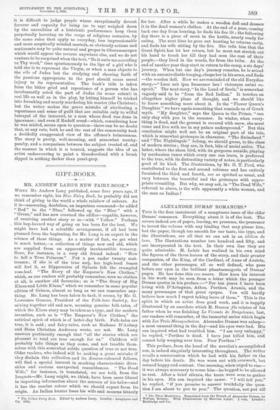ALEXA.NDRE DUMAS' ROMANCES.* THIS is the first instalment of a
sumptuous issue of the elder Dumas' romances. Everything about it is of the best. The covers indeed are of paper, leaving, we presume, the possessor to invest the volume with any binding that may please him, but the paper, though too smooth for our taste, the type, and the illustrations, are all that we can ask in an edition de 146xe. The illustrations number two hundred and fifty, and are incorporated in the text. In their own line they are quite admirable. M. Leloir has realised in his own mind the figures of the three heroes of the story, and their greater companion, of the King, of the Cardinal, of Anne of Austria, and the other personages, all so well defined, who pass before our eyes in the brilliant phantasmagoria of Dumas' pages. He has done this con amore. How keen his interest in his work may be seen from a letter which the younger Dumas quotes in his preface :—" For ten years I have been living with D'Artagnan, Athos, Porthos, Aramis, and the many personages of that great epopee. You will hardly believe how much I regret taking leave of them." This is the spirit in which an artist does good work, and it is happily illustrated by an anecdote which M. Dumas file relates of his father when he was finishing Le Vicomte de Bra gelonne, last, our readers will remember, of the immortal series which begin with Les Troia Moaequetairce. Alexandre Dumas was asleep— a most unusual thing in the day—and his eyes were bad. His son inquired what had troubled him. "I am very unhappy," he replied, " Porthos is dead. I have just killed him, and cannot help weeping over him. Poor Porthos ! "
This preface, from the hand of the novelist's accomplished son, is indeed singularly interesting throughout. The writer recalls a conversation which he had with his father on the day before his death. He was worn out with overwork, but seemed happy and content. One morning, when urged to rise— it was always necessary to rouse him—he begged to be allowed to rest. After a brief silence, the tears were seen to gather in his eyes. His son inquired the cause. "I will tell you," he replied, "if you promise to answer truthfully the ques- tion I am about to put to you." The question, not put till * Tic Three Musketeers. Translated from the French of Alexandre Dumas, by William Robson. With Illustrations by Maurice Weir, 2 vols. London ; Rontledge and Co. he had received the most solemn assurances of a candid answer, was this : "Do you believe that anything that I have written will survive me?" The son had no difficulty, it may be believed, in answering "Yes." That seemed to satisfy him ; he spoke no more, and the next day passed away.
That Dumas' romances, or some of them, have survived him is a fact ; that they will continue to live is as certain as anything can be that belongs to the future. Nor, indeed, can any one, not a Puritan of the extremest type, pretend to regret their popularity. One would not put them into the hands of boys and girls, though indeed it needs but little change or omission to make the best of them fit for any one ; but for mature readers, and for the purpose—which novelists of the day ignore with a quite lamentable persistence— of entertaining, they are admirable. It was a saying of Corot, "Art is not art unless it makes man merry." If one could inflict an imposition on grown-up men and women as one inflicts it on children, there are novelists not a few who would have to write out this noble maxim at least ten thousand times. IL Dumas relates how a great hospital surgeon said to him the other day, "All our hospital patients recover or die with one of your father's books under his pillow. When we wish to make them forget the terror of an approaching operation, the tediousness of convalescence, or the dread of death, we prescribe one of your father's novels, and they are able to forget." A writer who can do this will surely never be forgotten. We are glad to remember him ; as for some at least of his successors of to-day, they may be powerful, intense, and we know not what besides, but they are not entertaining; if we expect to find them under any pillow, it is under the pillow of a suicide.



















































 Previous page
Previous page